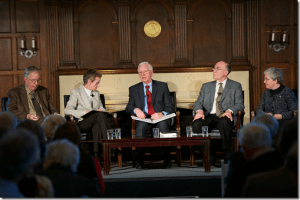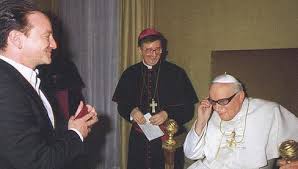
Martin Luther King, Jr. joining hands with Catholic clergy and other religious leaders.
[Note: The Teilhard de Chardin Quote of the Week will appear tomorrow]
In the United States, we celebrate the life and ideals of Martin Luther King, Jr. today. Last Saturday, I went to see the movie Selma. I came in with low expectations, expecting a typical Hollywood story that would depict Dr. King as a one-dimensional larger than life figure and “secularize” the Christian faith component of Dr. King. After watching the film, I was pleasantly surprised. Despite some historical inaccuracies (especially the portrayal of President Lyndon Johnson), it was overall an outstanding film. It showed Dr. King as a very complex person, including his doubts and sins that plagued him and his relationships (especially with Coretta Scott King). It also showed the deep Christian faith that Dr. King had that inspired him with the courage to lead his non-violent movement for justice.
Today, I would like to reflect on something I wrote last year on Martin Luther King Day which showed how the Catholic concept of moral law was the basis Dr. King used to support his nonviolent actions to promote civil rights. Perhaps the most prominent example of this combination is King’s actions in 1963 in Birmingham and the related Letters from a Birmingham Jail.
According to Wikipedia, The Birmingham Campaign began on April 3, 1963, with coordinated marches and sit-ins against racism and racial segregation in Birmingham, Alabama. The non-violent campaign was coordinated by Alabama Christian Movement for Human Rights and King’s Southern Christian Leadership Conference. On April 10, Circuit Judge W. A. Jenkins issued a blanket injunction against “parading, demonstrating, boycotting, trespassing and picketing”. Leaders of the campaign announced they would disobey the ruling. On April 12, King was roughly arrested and put in jail.
King met with unusually harsh conditions in the Birmingham jail. An ally smuggled in a newspaper from April 12, which contained “A Call for Unity”: a statement made by eight white Alabama clergymen against King and his methods. The letter provoked King and he began to write a response on the newspaper itself. King writes in Why We Can’t Wait: “Begun on the margins of the newspaper in which the statement appeared while I was in jail, the letter was continued on scraps of writing paper supplied by a friendly black trusty, and concluded on a pad my attorneys were eventually permitted to leave me.”
King responded to his fellow clergy in a tone and spirit of brotherly love. However, he was also very clear in his advocacy of the righteousness of his position. The brilliance of King’s letter is that his response was grounded in the core of Christian faith without belittling his opponents. The full text of the letter can be found here but set forth below is a key excerpt which highlights the Catholic moral law as the foundation for his actions:
[T]here are two types of laws: there are just laws, and there are unjust laws. I would agree with St. Augustine that “An unjust law is no law at all.” Now, what is the difference between the two? How does one determine when a law is just or unjust? A just law is a man-made code that squares with the moral law, or the law of God. An unjust law is a code that is out of harmony with the moral law. To put it in the terms of St. Thomas Aquinas, an unjust law is a human law that is not rooted in eternal and natural law. Any law that uplifts human personality is just. Any law that degrades human personality is unjust. All segregation statutes are unjust because segregation distorts the soul and damages the personality. It gives the segregator a false sense of superiority and the segregated a false sense of inferiority. To use the words of Martin Buber, the great Jewish philosopher, segregation substitutes an “I – it” relationship for the “I – thou” relationship and ends up relegating persons to the status of things. So segregation is not only politically, economically, and sociologically unsound, but it is morally wrong and sinful. Paul Tillich has said that sin is separation. Isn’t segregation an existential expression of man’s tragic separation, an expression of his awful estrangement, his terrible sinfulness?”
In 2013, in honor of the 50th anniversary of Letters From a Birmingham Jail, Christian Churches Together in the U.S.A., a broad coalition of Christian churches (including Catholic, Orthodox, mainline protestant, evangelical protestant) issued a response. The response is equal to Dr. King’s in its commitment to the Christian ideal and social justice. The full text can be found here but set forth is an excerpt:
As church leaders, we confess we have tended to emphasize our responsibility to obey the law while neglecting our equal moral obligation to change laws that are unjust in their substance or application. All too often, the political involvement of Christians has been guided by the pursuit of personal or group advantage rather than a biblically grounded moral compass. We confess it is too easy for those of us who are privileged to counsel others simply to “wait”—or to pass judgment that they deserve no better than what they already have.
We confess that we are slow to listen and give legitimacy to those whose experience of race relations and social privilege in America is different than our own. We keep the “other” at arm’s length to avoid hearing the call to sacrifice on their behalf. Our reluctance to embrace our “inescapable network of mutuality” underscores Dr. King’s observation that privileged groups seldom give up their advantages voluntarily. For example, it is difficult to persuade most suburban Christians to demand that they strive for the same quality of education in our cities that they take for granted in their own schools. To the extent that we do not listen in love, our influence in society is limited to “a weak, ineffectual voice with an uncertain sound.”
We confess that we often prefer stability to upheaval, even when upheaval is the necessary precondition for the establishment of justice. We confess that we often avoid the fiscal, emotional, and spiritual costs of changing our beloved institutions—even when called to do so by our Lord and Savior. Our churches and denominational structures thus fail in critical ways to model the “creative psalm of brotherhood” invoked by Dr. King. Recent efforts in the Christian community toward “racial reconciliation,” though laudable in intent, tend to stop short of Dr. King’s vision of true justice and fellowship. Sunday morning remains the most segregated time in our nation.”
Dr. King and Christian Churches Together set a high standard for all of us to follow. I pray today that I may have the wisdom and courage to follow their example.
Resources:
Letters From a Birmingham Jail
Christian Churches Together Response to Letters from a Birmingham Jail
U.S. Catholic Bishops Resources on the “Response”










 “You are my beloved [Son]; with you I am well pleased” (Luke 3:22, NABRE).
“You are my beloved [Son]; with you I am well pleased” (Luke 3:22, NABRE).